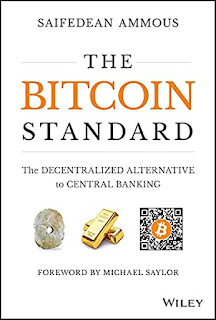Book: The Bitcoin Standard: The Decentralized Alternative to Central Banking: https://amzn.to/3NOCvsO
Abstract
Bitcoin is a digital or virtual currency that was created in 2009. It is decentralized, meaning that it is not subject to government or financial institution control. Bitcoin transactions are verified by network nodes through cryptography and recorded in a public dispersed ledger called a blockchain.
Bitcoin Souvenir: Bitcoin Coin Souvenir with Coin Case, Physical Bitcoin Collection, Gold Plated Bitcoin for Commemoration, Crypto Currency Coin BTC for Gift, Gold Bitcoin Tokens: https://amzn.to/3XrHOBR
Bitcoin has a number of potential benefits, including:
* **Decentralization:** Bitcoin is not subject to government or financial institution control. This makes it a more secure and anonymous way to store and transfer value.
* **Limited supply:** There will only ever be 21 million bitcoins created. This means that Bitcoin is a scarce asset, which could potentially drive up its value in the future.
* **Portability:** Bitcoin can be easily transferred between users without the need for a third party. This makes it a convenient way to send and receive payments.
* **Transparent:** Bitcoin transactions are recorded on a public blockchain, which makes them transparent and auditable.
However, Bitcoin also has a number of potential drawbacks, including:
* **Volatile:** The price of Bitcoin is highly volatile, which means that its value can fluctuate wildly. This makes it a risky investment.
* **Energy-intensive:** The mining process for Bitcoin requires a significant amount of energy. This has led to concerns about the environmental impact of Bitcoin.
* **Fraudulent:** There have been reports of fraud and scams involving Bitcoin. This is a risk that investors should be aware of.
Overall, Bitcoin is a complex and controversial asset. It has the potential to be a disruptive technology, but it also comes with risks. Investors should carefully consider the pros and cons before deciding whether to invest in Bitcoin.
Here are some additional keywords that could be used in the abstract:
* Blockchain
* Cryptocurrency
* Decentralized
* Peer-to-peer
* Security
* Transparency
* Volatility
* Energy-intensive
* Fraud
Introduction
Bitcoin is a digital or virtual currency that was created in 2009. It is decentralized, meaning that it is not subject to government or financial institution control. Bitcoin transactions are verified by network nodes through cryptography and recorded in a public dispersed ledger called a blockchain.
Here are some of the pros and cons of Bitcoin:
Pros
* **Decentralized:** Bitcoin is not subject to government or financial institution control. This makes it a more secure and anonymous way to store and transfer value.
* **Limited supply:** There will only ever be 21 million bitcoins created. This means that Bitcoin is a scarce asset, which could potentially drive up its value in the future.
* **Portable:** Bitcoin can be easily transferred between users without the need for a third party. This makes it a convenient way to send and receive payments.
* **Transparent:** Bitcoin transactions are recorded on a public blockchain, which makes them transparent and auditable.
Cons
* **Volatile:** The price of Bitcoin is highly volatile, which means that its value can fluctuate wildly. This makes it a risky investment.
* **Energy-intensive:** The mining process for Bitcoin requires a significant amount of energy. This has led to concerns about the environmental impact of Bitcoin.
* **Fraudulent:** There have been reports of fraud and scams involving Bitcoin. This is a risk that investors should be aware of.
Overall, Bitcoin is a complex and controversial asset. It has the potential to be a disruptive technology, but it also comes with risks. Investors should carefully consider the pros and cons before deciding whether to invest in Bitcoin.
Additional Information
* **Where to buy Bitcoin:** There are a number of exchanges where you can buy Bitcoin, including Coinbase, Kraken, and Binance.
* **How to store Bitcoin:** There are a number of ways to store Bitcoin, including hardware wallets, software wallets, and paper wallets.
* **How to use Bitcoin:** Bitcoin can be used to buy goods and services from a growing number of merchants. It can also be used to send and receive payments.
I hope this article has been informative. Please let me know if you have any other questions.
Sources
- indiacsr.in/bitcoin-and-worlds-progress/
- creatiplicity.com/what-is-99-in-bitcoin/











